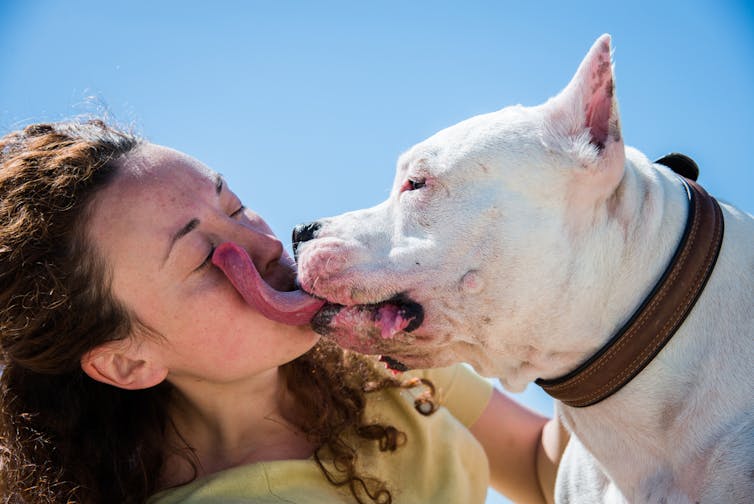Sarah McLean, Swinburne University of Technology and Enzo Palombo, Swinburne University of Technology
Our relationship with pets has changed drastically in recent decades. Pet ownership is at an all-time high, with a recent survey finding 69 per cent of Australian households have at least one pet. We spend an estimated $33 billion every year on caring for our fur babies.
While owning a pet is linked to numerous mental and physical health benefits, our pets can also harbour infectious diseases that can sometimes be passed on to us. For most people, the risk is low.
But some, such as pregnant people and those with weakened immune systems, are at greater risk of getting sick from animals. So, it’s important to know the risks and take necessary precautions to prevent infections.
What diseases can pets carry?
Infectious diseases that move from animals to humans are called zoonotic diseases or zoonoses. More than 70 pathogens of companion animals are known to be transmissible to people.
Sometimes, a pet that has a zoonotic pathogen may look sick. But often there may be no visible symptoms, making it easier for you to catch it, because you don’t suspect your pet of harbouring germs.
Zoonoses can be transmitted directly from pets to humans, such as through contact with saliva, bodily fluids and faeces, or indirectly, such as through contact with contaminated bedding, soil, food or water.
Studies suggest the prevalence of pet-associated zoonoses is low. However, the true number of infections is likely underestimated since many zoonoses are not ‘notifiable‘, or may have multiple exposure pathways or generic symptoms.
Dogs and cats are major reservoirs of zoonotic infections (meaning the pathogens naturally live in their population) caused by viruses, bacteria, fungi and parasites. In endemic regions in Africa and Asia, dogs are the main source of rabies which is transmitted through saliva.
Dogs also commonly carry Capnocytophaga bacteria in their mouths and saliva, which can be transmitted to people through close contact or bites. The vast majority of people won’t get sick, but these bacteria can occasionally cause infections in people with weakened immune systems, resulting in severe illness and sometimes death. Recently, such a death was reported in Western Australia.
Cat-associated zoonoses include a number of illnesses spread by the faecal-oral route, such as giardiasis, campylobacteriosis, salmonellosis and toxoplasmosis. This means it’s especially important to wash your hands or use gloves whenever handling your cat’s litter tray.
Cats can also sometimes transmit infections through bites and scratches, including the aptly named cat scratch disease, which is caused by the bacterium Bartonella henselae.
Both dogs and cats are also reservoirs for methicillin-resistant bacterium Staphylococcus aureus (MRSA), with close contact with pets identified as an important risk factor for zoonotic transmission.

Birds, turtles and fish can also transmit disease
But it’s not just dogs and cats that can spread diseases to humans. Pet birds can occasionally transmit psittacosis, a bacterial infection which causes pneumonia. Contact with pet turtles has been linked to Salmonella infections in humans, particularly in young children. Even pet fish have been linked to a range of bacterial infections in humans, including vibriosis, mycobacteriosis and salmonellosis.
Close contact with animals – and some behaviours in particular – increase the risk of zoonotic transmission. A study from the Netherlands found half of owners allowed pets to lick their faces, and 18 per cent allowed dogs to share their bed. (Sharing a bed increases the duration of exposure to pathogens carried by pets.) The same study found 45 per cent of cat owners allowed their cat to jump onto the kitchen sink.
Kissing pets has also been linked to occasional zoonotic infections in pet owners. In one case, a woman in Japan developed meningitis due to Pasteurella multicoda infection after regularly kissing her dog’s face. These bacteria are often found in the oral cavities of dogs and cats.
Young children are also more likely to engage in behaviours which increase their risk of getting sick from animal-borne diseases – such as putting their hands in their mouth after touching pets. Children are also less likely to wash their hands properly after handling pets.
Although anybody who comes into contact with a zoonotic pathogen via their pet can become sick, certain people are more likely to suffer from serious illness. These people include the young, old, pregnant and immunosuppressed.
For example, while most people infected with the toxoplasmosis parasite will experience only mild illness, it can be life-threatening or cause birth defects in foetuses.

What should I do if I’m worried about catching a disease from my pet?
There are a number of good hygiene and pet husbandry practices that can reduce your risk of becoming sick. These include:
- washing your hands after playing with your pet and after handling their bedding, toys, or cleaning up faeces
- not allowing your pets to lick your face or open wounds
- supervising young children when they are playing with pets and when washing their hands after playing with pets
- wearing gloves when changing litter trays or cleaning aquariums
- wetting bird cage surfaces when cleaning to minimise aerosols
- keeping pets out of the kitchen (especially cats who can jump onto food preparation surfaces)
- keeping up to date with preventative veterinary care, including vaccinations and worm and tick treatments
- seeking veterinary care if you think your pet is unwell.
It is especially important for those who are at a higher risk of illness to take precautions to reduce their exposure to zoonotic pathogens. And if you’re thinking about getting a pet, ask your vet which type of animal would best suit your personal circumstances.
Sarah McLean, Lecturer in environmental health, Swinburne University of Technology and Enzo Palombo, Professor of Microbiology, Swinburne University of Technology
This article is republished from The Conversation under a Creative Commons licence. Read the original article.
Do you get super close to your pet? Have you considered the risks? Share your thoughts in the comments section below.
Also read: How to avoid huge vet bills and keep your pets healthy


My 2 dogs are much loved and cared for, but they have barriers. Not permitted in my private living areas (bedroom, bathroom, study), they don’t sit on couches, or my knees, and most definitely are not kissed, or carried around or dressed like babies. They prefer outdoors, and it’s been the same with most of my animals. My horse lived to age 37, he was never stabled. My last dog lived to age 21, current dog is 17. I don’t take them to shops or cafes, and absolutely disagree with this push to take them everywhere.
Totally agree with the last sntence.. Why do people have to take their dogs wherever they go. Train them to stay at home
What the hell is wrong with people these days they are germophobic and that is the biggest problem they can’t do anything unless they have a can or bottle of sort of disinfectant with them. They can’t let their children get a bit of dirt on themselves and that is why there is so many people getting sick because their bodies haven’t been able to build up an immunity. I am 70 years old and the only problems I have, have been caused by doctors, I grew up on farms, where you were licked you all the time you would be out in the paddocks and get all sorts of stuff on you and in any cuts you may have, and like I’ve already said the only issues that I have now has been caused by doctors in my later years.